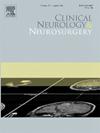Middle meningeal artery embolization versus conventional management for patients with chronic subdural hematoma: An umbrella review
IF 1.8
4区 医学
Q3 CLINICAL NEUROLOGY
引用次数: 0
Abstract
Background and objectives
Conventional surgical modalities, including twist drill craniotomy, burr hole evacuation, and craniotomy, are the standard surgical interventions for chronic subdural hematomas (cSDH). More recently, treatment of cSDH with middle meningeal artery embolization (MMAE) is being explored. The comparative effectiveness of MMAE versus conventional surgical modalities remains controversial. The objective of this study is to analyze various postoperative outcomes in an umbrella review of existing meta-analysis comparing MMAE and conventional management in patients with cSDH.
Methods
A systematic literature search was executed with defined criteria across PubMed, Scopus, and Web of Science databases. Data was analyzed utilizing the metaumbrella R package, employing equivalent Hedges’ g values. The quality assessment of each meta-analysis was carried out using AMSTAR2, assigning scores within the range of 0–11. The credibility of the evidence was determined by applying the Ioannidis criteria.
Results
This umbrella review study included five meta-analyses. Upon pooling the meta-analyses, MMAE was associated with fewer reoperations and recurrence, supported by a weak level of evidence (class IV). Conversely, findings related to other postoperative outcomes did not reach statistical significance.
Conclusion
Our umbrella review offers a comprehensive summary investigating MMAE and conventional management for the treatment of cSDH. MMAE had fewer reoperations and recurrence, but they were classified as being of weak significance. These findings underscore insufficient evidence within the existing literature, emphasizing the imperative need for additional research in this area.
慢性硬膜下血肿患者的脑膜中动脉栓塞治疗与传统治疗方法对比: 综述
背景和目的传统手术方式,包括扭钻开颅术、毛刺孔排空术和开颅术,是治疗慢性硬膜下血肿(cSDH)的标准外科干预措施。最近,人们正在探索用脑膜中动脉栓塞术(MMAE)治疗慢性硬膜下血肿。MMAE 与传统手术方式的有效性比较仍存在争议。本研究的目的是对现有的荟萃分析进行综述,比较 MMAE 和传统治疗方法对 cSDH 患者的各种术后效果。使用 metaumbrella R 软件包分析数据,并采用等效的赫奇斯 g 值。使用 AMSTAR2 对每项荟萃分析进行质量评估,评分范围为 0-11 分。采用 Ioannidis 标准确定证据的可信度。汇总荟萃分析后发现,MMAE 与较少的再手术和复发有关,证据水平较弱(IV 级)。相反,与其他术后结果相关的研究结果未达到统计学意义。结论我们的总括性综述对 MMAE 和传统治疗方法治疗 cSDH 进行了全面总结。MMAE 的再手术和复发率较低,但其意义较弱。这些发现凸显了现有文献中证据的不足,强调了在这一领域开展更多研究的迫切需要。
本文章由计算机程序翻译,如有差异,请以英文原文为准。
求助全文
约1分钟内获得全文
求助全文
来源期刊

Clinical Neurology and Neurosurgery
医学-临床神经学
CiteScore
3.70
自引率
5.30%
发文量
358
审稿时长
46 days
期刊介绍:
Clinical Neurology and Neurosurgery is devoted to publishing papers and reports on the clinical aspects of neurology and neurosurgery. It is an international forum for papers of high scientific standard that are of interest to Neurologists and Neurosurgeons world-wide.
 求助内容:
求助内容: 应助结果提醒方式:
应助结果提醒方式:


